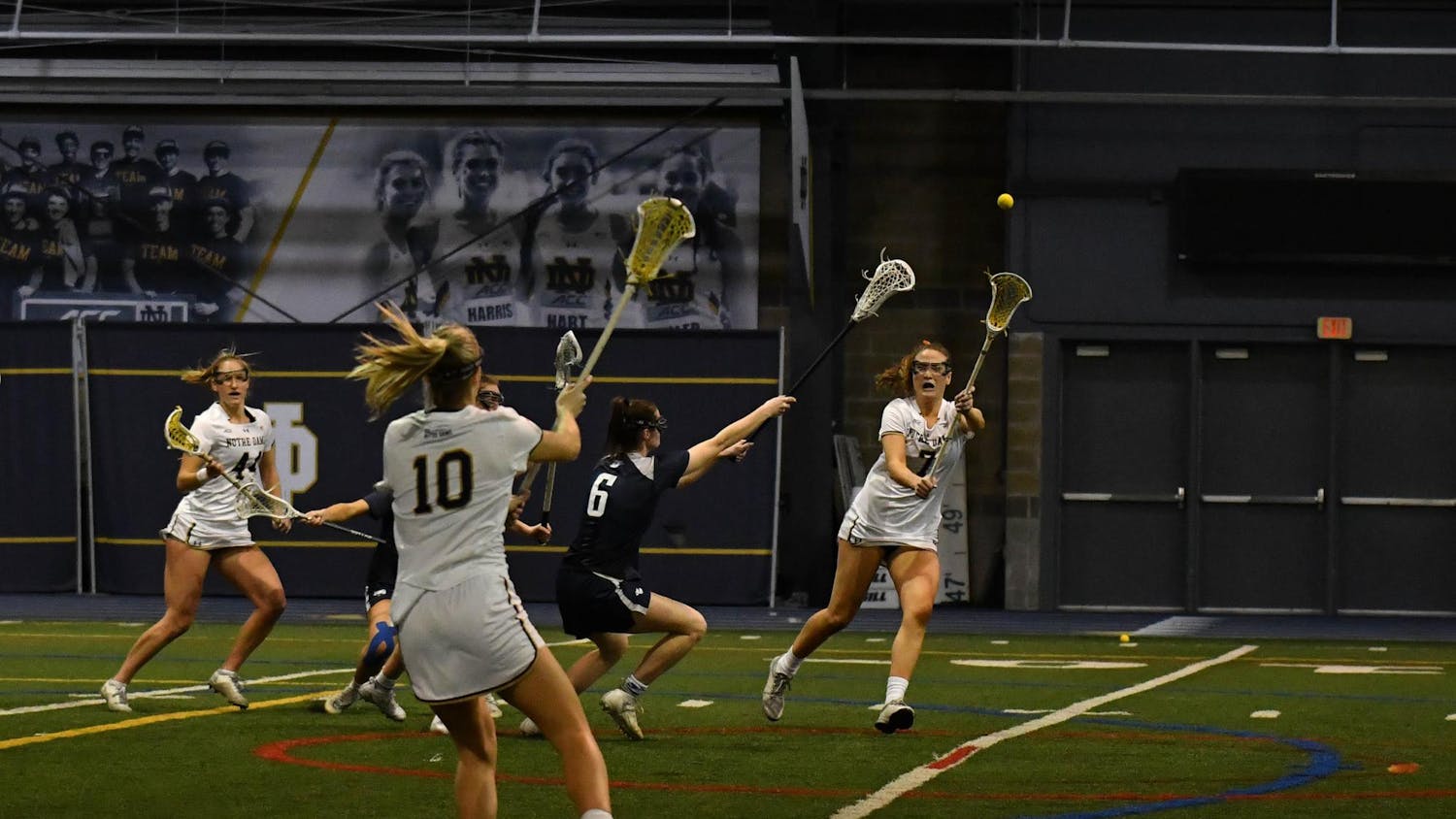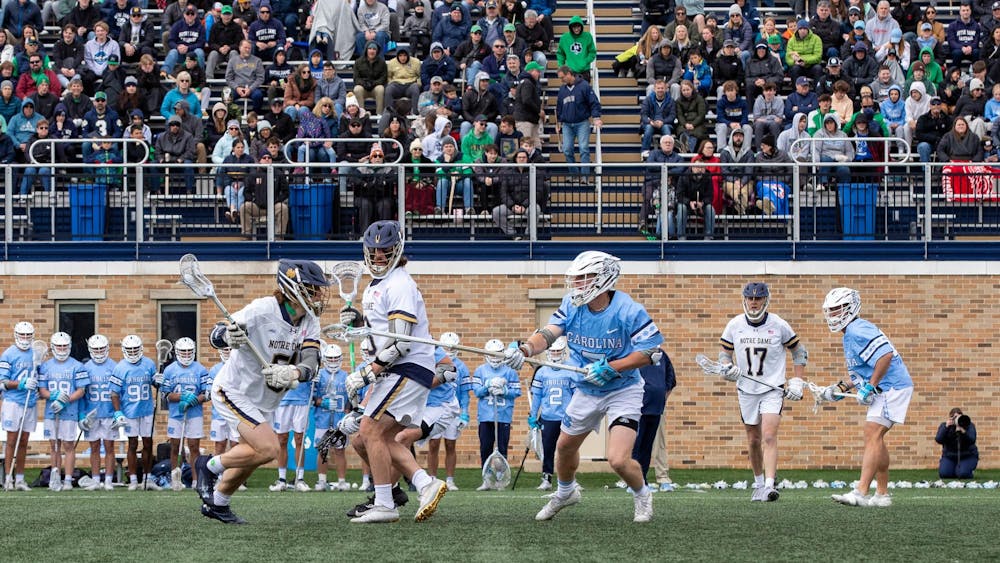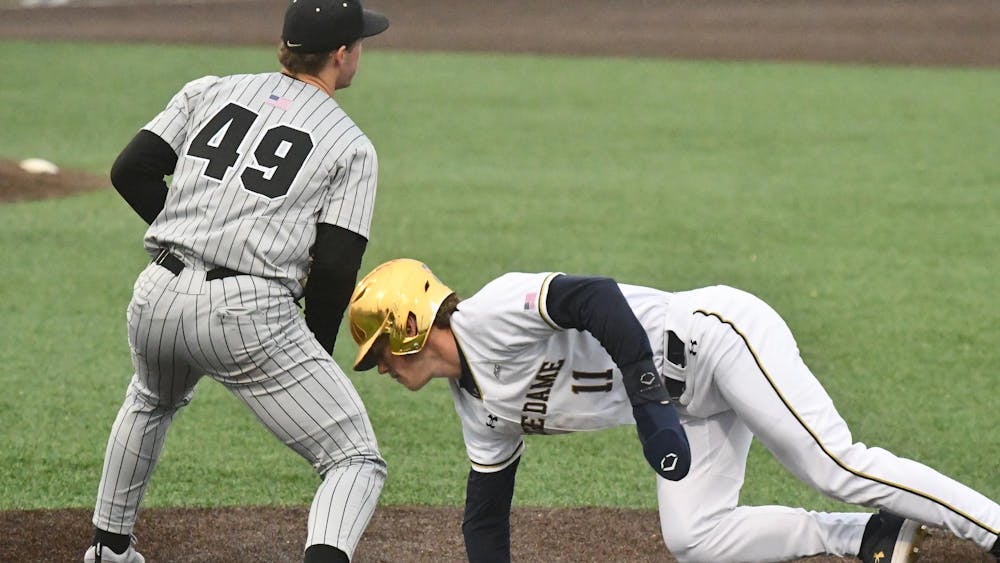Editor's note: this interview with Notre Dame director of athletics Jack Swarbrick took place in mid-December after The Observer's final publication of the fall semester.
The last time we sat down and talked to you, you said you didn't necessarily see a whole lot of movement in the conference landscape. Obviously there was a lot of speculation and a lot of movement. Looking forward, do you see that again happening? I'm sure it's been at the top of your priority list for some time.

There are a lot of odd factors that are at play right now which are a little different. You know, so much of this is motivated by postseason football issues like automatic qualification status. I think there's a likelihood that something about the format of postseason will change in the next year. And depending on what form that takes, it may produce change. Absent that piece of information, it's hard to predict what might happen. But setting that aside, I think with the Big East having solidified itself through these recent moves I think among the BCS conferences it'll be pretty stable.
What type of moves in the postseason structure are we talking? Plus-one, or is that kind of up in the air?
To be determined. Some people at a conference last week in New York expressed a view that a plus-one was inevitable. I don't necessarily share that view.It may be, and that could be a result, but I think that are a host of things on a spectrum from sort of a return to a free-market approach where the bowls and the schools and conferences do their own thing to a plus-one. There's a spectrum of possibilities from one end to the other.
With the Big East solidifying itself, do you see that as a viable long-term home for Notre Dame athletics?
We're really happy that the Big East, which has been a great home to us, was able to make the moves it made and has announced. We think that's good for the Big East and at this point we're just focused on that issue — the Big East's viability.
You mentioned last time possibly exploring a Notre Dame network. In the last six months or so, has there been any significant progress towards that?

Yeah, there really has been — significant staffing to help begin to deliver on that potential, we'll be dedicating some space in the Joyce Center where the old varsity shop was by the hockey rink to that purpose, and we're in discussions with Comcast/NBC about how to expand our capabilities. And I think people have seen it manifest in the amount of digital programming that's been produced in the past six months, especially in this football season with the behind-the-scenes elements and the exclusive content that we've been able to produce.
Is it clear when some sort of official network would launch?
You'll never flip a switch and have a network. This is about producing a lot more digital content across the University —not just athletics — managing that digital content, and distributing it broadly. So it reflects a fundamental difference about Notre Dame. We don't have a geographic area to serve. we have to serve a much broader area so our approach has to be different than the Big Ten Network or the Longhorn Network so it's fundamentally different in that it won't be a network owned by us and distributed by third parties, it'll be content owned by us and distributed by third parties.
Two years in, have you been pleased with coach Kelly's success?
Yeah, I'm thrilled with where the program is because what we were focused on when we made a transition were certain program elements: the foundational elements you have to have from strength and conditioning to nutrition to the way we manage the schedule of the student-athletes and all of those foundational — recruiting, all those foundational pieces are in place. We've been very good as the years have gone on in coach Kelly's first two years in sort of building the season and that reflects all of those things. I think we all have the same perspective on this season: but for the turnovers, it could have been a very, very special season. We have to fix that, but when you look at the other elements of the team's performance, it was quite good.
The administration had expressed concerns before the USC game of student behavior, tailgating behavior, and all of that type of thing. From everything I saw, it seemed to be very well-behaved. Does that open the possibility to future night games, as soon as maybe next season?
I think we'll sit down and talk about that in the months ahead, but you are right that the student body and our fans in general could not have done a better job of their embrace of the night game. It was an electric atmosphere, the behavior was great, and so everything about it, thanks to all our fans, turned out to be a very successful experiment.
As far as scheduling goes, 2012 is a difficult schedule. You mentioned you were looking to release schedules beyond 2012 sometime soon. Again, is that the conference uncertainty that is holding that up?
Yes. What some of those conference changes have done is caused games you had to disappear. So we're just trying to make sure everything settles out before we release those. We've got a couple of off-sites to resolve, the neutral-site games, but other than that, we're in great shape through ‘17 if we don't have to change games because people's conference affiliation or the number of games a conference decides to play changes.
There's the game in Ireland next year, and now the report about discussions about the Stanford game in China. Is that going to be more of a trend throughout college football, pushing outside the borders of the United States?
I don't know that it will be a trend. I think there are some schools that can better take advantage of it than others. I think the opportunity for Stanford and Notre Dame, given the reputations of both schools and our close working relationship, to do it is exciting. It's not necessarily something everybody can do.
As far as both Notre Dame Stadium and the Joyce Center go, are there any facilities upgrades planned in the near future, or in discussion? Perhaps the playing surface or anything like that?
We'll continue to look at the issues of how to make the playing surface better. It hasn't met our expectations the past two years, and then of course we had a tough playing surface in our last game on the road, which sort of brought even greater focus on this issue for us. So we continue to think about that. Facility-wise, our priority is a boathouse for our women's rowing program and the repurposing of the north dome of Joyce now that hockey has moved to [the Compton Family Ice Arena.] So those are the two facility things that have near-term focus. A little longer-term we really want to find a way to find a way to create a practice venue for our basketball teams.
Has there been any discussion of doing that in the north dome of the Joyce Center?
We've looked at it. It doesn't appear to be workable.
Moving outside football, what have your thoughts on the non-football sports been this far into the year? Maybe not quite the success of last year, but have you been pleased thus far?
Those programs continue to perform at such a high level — both cross country sports made it to the NCAA Championships. With sports like soccer, there's so many outcomes in which you can play a great game and not win — the outcome of the game you don't fully control. So you're going to have some years where you get on the sort of run we got on last year with the women and other years where you don't, but the level of play continues to be very high. The quality of the student-athletes is great, so very pleased with the fall. We're into winter now, obviously our women's basketball team is performing in an exceptional level — really excited about that. The men's team has suffered some really challenging blows but I love the way they've dealt with them. I love the experience the young guys are getting, and the resiliency of this team. I think it sets us up for the long term very well. Hockey is playing very well in its new home and I really look forward to them continuing to build momentum. We've had some extraordinary performances in swimming by individual athletes. I could go on all day. I mean, we've really had a lot of good things going on.
As far as the Compton Ice Arena goes, I've been blown away. Has that been the general reaction?
Yeah, it really has. I've been so gratified by the reaction to it. The embrace by the community is what's really exciting. I tend to wander over there when I'm going out for lunch or something, and I love that almost anytime I go in — especially on a weekend — it's packed. I mean, you've got four teams playing hockey and four teams waiting to go on for the next games. You've got recreational skating. You've got people renting it for community parties. We hosted an adopt-a-family Christmas program in it last weekend which couldn't have been better. So it's not just that it's a great home for our hockey program and a great place to go and cheer for them, it's that it's getting the sort of community use that we envisioned for it.
As far as the hockey program goes, with the national TV deal with NBC Sports and Hockey East, is hockey becoming one of the marquee sports at Notre Dame? Is that the goal?
Well, the goal with all our sports is to figure out how to maximize their ability to help promote Notre Dame and contribute to Notre Dame's mission. A set of circumstances in hockey let us take advantage of that in a unique way. So yes, the fact that we will be able to have so many of our games broadcast nationally is such a unique position for a college hockey team to be in, and we love that. We love that our partners at Comcast/NBC wanted to help make that happen, we love that we have a facility that accommodates it. So it's a really good model for us, and the more we can do that, the more we can find ways to control the media rights of home contests — we do in football, we do in hockey — the more we want to take advantage of that.
NCAA-wise, in October, the full cost of attendance issue came up. As I understand it, it was conferences could vote whether to allow that. How does that work for Notre Dame in football, not being affiliated with a conference?
It's an incredibly complex topic because yesterday a sufficient number of votes were cast to override the legislation — a call for an override, that's it's going to be subject to a vote by the membership, and so it's in limbo in a sense right now. There's another chapter in what the cost-of-attendance rules are that we're all trying to figure out right now. It's a complicated situation. We're in a position where we do get to make that decision for football about how we'll approach it because we're independent. If it's available to us, if there's legislation that allows it — as I indicated, it's up in the air right now — we will do it. We'll do it in the manner allowed by the NCAA. We'll take full advantage of it.
There's been a lot of criticism of the NCAA in a number of respects. You've had plenty of experience with them. Do you see any major changes in the way they do business and the way the college landscape works?
I think that the good news is that we've got really effective leadership at the NCAA and they're doing a great job of trying to deal with a host of very difficult issues and I think all of us in the industry are pleased with the efforts. Those issues are so complex and so difficult that we're going to have to be very creative about what the solutions are, but I love the effort and I love the intellectual energy and horsepower that's going to try and solve it. A fundamental problem we face — and by ‘we' I mean everyone in collegiate athletics — is do we have a sufficient commonality of mission and focus with our programs. Are we in the same business? Because at the very fundamental level, the challenge here is that it's a lot of institutions, it's a very large number of institutions all involved in collegiate athletics, and do we have a common focus, are we engaged in the same business? That underlies a lot of the NCAA's struggles.












